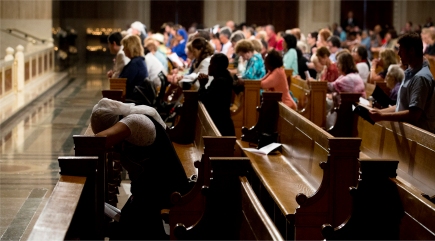
Renewing the Passion
Supporting the Vocational Calling of Catholic High School Teachers
New Initiatives
From The Field: Today’s “Traditional Believer”
November 12 2013

Every year, another study comes out regarding the spirituality of the American people. A small but solid study conducted by Newsweek and BeliefNet back in 2005 asked 1,004 adults about their faith. Here are some of the results:
- 3 out of 4 adults in this survey describe themselves as "traditional believers."
- More than 3 out of 4 adults say that spirituality is important to them.
- Approximately 80 percent overall (91 percent of Catholics) believe that the universe was created by God, the soul goes to Heaven or Hell when someone dies, and someone of another religion can also go to Heaven or attain salvation.
- 45 percent of those polled said they attend church or worship services at least once a week. The number rose to 60 percent when we include those who attend once or twice a month.
- 64 percent said they pray daily. Eighty percent pray at least once a week.
- 45 percent read from sacred text at least once a week. Thirty-three percent do so more than once a week.
When asked what was the main reason they practiced their religion,
- 44 percent replied: To forge a personal relationship with God.
- 31 percent replied: To be a better person and to live a moral life.
- 17 percent replied: To find happiness and peace of mind.
- Only 3 percent replied: To be part of a community.
- 43 percent participate in a spiritual activity not connected with a church or house of worship at least once a week. 21 percent do so daily.
(For more, go online to the Newsweek/Beliefnet Poll, August 2005.)
Through these statistics, we can see the picture of today’s “traditional believer”: God Created Us. There are multiple religious paths to Heaven. Spirituality is important.
The vertical and the horizontal dimensions of spirituality are the main reason most people practice their religion. Some find peace and happiness in their religion.
And hardly anyone is motivated to practice their religion in order to be part of a faith community.
How should this influence our teaching? What specific concepts need to be restored/affirmed/challenged/discussed?
We are looking for articles for submission. If you have something you think is worth sharing with your colleagues, please submit your article (750 words) to hsarticles@osv.com. Articles can be about new approaches, research, or initiatives you have implemented at your school.

